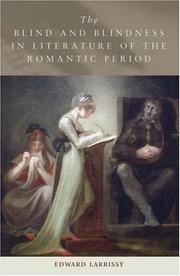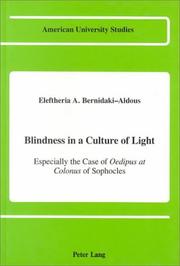| Listing 1 - 9 of 9 |
Sort by
|
Book
ISBN: 8886398743 9788886398749 Year: 2001 Publisher: Dronero: L'arciere,
Abstract | Keywords | Export | Availability | Bookmark
 Loading...
Loading...Choose an application
- Reference Manager
- EndNote
- RefWorks (Direct export to RefWorks)
Book
Year: 1978 Publisher: Buenos Aires : Castañeda,
Abstract | Keywords | Export | Availability | Bookmark
 Loading...
Loading...Choose an application
- Reference Manager
- EndNote
- RefWorks (Direct export to RefWorks)
Blind in literature. --- Sábato, Ernesto R. --- Criticism and interpretation.

ISBN: 0748651691 1281251933 9786611251932 0748632018 9780748632015 9781281251930 9780748651696 6611251936 0748632816 9780748632817 Year: 2007 Publisher: Edinburgh Edinburgh University Press
Abstract | Keywords | Export | Availability | Bookmark
 Loading...
Loading...Choose an application
- Reference Manager
- EndNote
- RefWorks (Direct export to RefWorks)
In the first full-length literary-historical study of its subject Edward Larrissy examines the philosophical and literary background to representations of blindness and the blind in the Romantic period.
Blindness in literature. --- Blind in literature. --- English literature --- History and criticism. --- Romanticism --- English poetry
Book
ISBN: 0472029584 9780472029587 1306357918 9781306357913 9780472119066 0472119060 Year: 2014 Publisher: Ann Arbor : The University of Michigan Press,
Abstract | Keywords | Export | Availability | Bookmark
 Loading...
Loading...Choose an application
- Reference Manager
- EndNote
- RefWorks (Direct export to RefWorks)
Sheds new light on literary representations of blindness from a disability studies perspective.

ISBN: 0820410241 Year: 1990 Volume: vol. 8 Publisher: New York (N.Y.): Lang
Abstract | Keywords | Export | Availability | Bookmark
 Loading...
Loading...Choose an application
- Reference Manager
- EndNote
- RefWorks (Direct export to RefWorks)
Blind in literature --- Blindness in literature --- Blindness --- Light and darkness in literature --- Oedipus (Greek mythology) in literature --- Amaurosis --- Vision disorders --- History --- Sophocles. --- Blindness in literature. --- Blind in literature. --- Light and darkness in literature. --- History. --- Oedipus --- In literature.
Book
ISBN: 295068971X Year: 1993 Publisher: Ramonville Saint-Agné (France) : Editions Le Tour d'y voir,
Abstract | Keywords | Export | Availability | Bookmark
 Loading...
Loading...Choose an application
- Reference Manager
- EndNote
- RefWorks (Direct export to RefWorks)
Blind --- Blind in literature --- Blindness --- Blindness in literature --- Aveugles --- Aveugles dans la littérature --- Cécité --- Cécité dans la littérature --- Congress --- Mythology --- Congrès --- Mythologie

ISBN: 0415927420 0415927439 9780415927420 9780415927437 Year: 2001 Publisher: New York (N.Y.) Routledge
Abstract | Keywords | Export | Availability | Bookmark
 Loading...
Loading...Choose an application
- Reference Manager
- EndNote
- RefWorks (Direct export to RefWorks)
Blind --- Blind in literature --- Aveugles --- Aveugles dans la littérature --- Public opinion --- Opinion publique --- Blind in art. --- Blind in literature. --- History. --- Public opinion. --- #PBIB:2005.4 --- Geschiedenis van opvoeding en onderwijs --- handboeken en inleidingen --- handboeken en inleidingen. --- Aveugles dans la littérature --- Blind in art --- Blind people --- Blind persons --- Blindness --- People with visual disabilities --- Deafblind people --- History --- Patients --- Blind - History. --- Blind - Public opinion.
Book
ISBN: 0691609543 1400858585 9781400858583 0691067104 9780691067100 9780691609546 Year: 1987 Publisher: Princeton (N.J.): Princeton university press
Abstract | Keywords | Export | Availability | Bookmark
 Loading...
Loading...Choose an application
- Reference Manager
- EndNote
- RefWorks (Direct export to RefWorks)
Paulson examines literary, philosophical, and pedagogical writing on blindness in France from the Enlightenment, when philosophical speculation and surgical cures for cataracts demystified the difference between the blind and the sighted, to the nineteenth century, when the literary figure of the blind bard or seer linked blindness with genius, madness, and narrative art. A major theme of the book is the effect of blindness on the use of language and sign systems: the philosophes were concerned at first with understanding the doctrine of innate ideas, rather than with understanding blindness as such. Originally published in 1987.The Princeton Legacy Library uses the latest print-on-demand technology to again make available previously out-of-print books from the distinguished backlist of Princeton University Press. These editions preserve the original texts of these important books while presenting them in durable paperback and hardcover editions. The goal of the Princeton Legacy Library is to vastly increase access to the rich scholarly heritage found in the thousands of books published by Princeton University Press since its founding in 1905.
Romanticism --- Enlightenment. --- Blind in literature. --- Blind --- Blindness --- French literature --- Blindness in literature. --- Aufklärung --- Eighteenth century --- Philosophy, Modern --- Rationalism --- Blind people --- Blind persons --- People with visual disabilities --- Deafblind people --- Amaurosis --- Vision disorders --- History. --- History and criticism. --- Patients --- Blind in literature --- Blindness in literature --- Enlightenment --- History --- History and criticism --- History of human medicine --- Ophthalmology --- Thematology --- anno 1700-1799 --- anno 1800-1899 --- France
Book
ISBN: 110830270X 1108302807 1108151868 1107194210 1316645444 Year: 2018 Publisher: Cambridge : Cambridge University Press,
Abstract | Keywords | Export | Availability | Bookmark
 Loading...
Loading...Choose an application
- Reference Manager
- EndNote
- RefWorks (Direct export to RefWorks)
In this innovative and important study, Heather Tilley examines the huge shifts that took place in the experience and conceptualisation of blindness during the nineteenth century, and demonstrates how new writing technologies for blind people had transformative effects on literary culture. Considering the ways in which visually-impaired people used textual means to shape their own identities, the book argues that blindness was also a significant trope through which writers reflected on the act of crafting literary form. Supported by an illuminating range of archival material (including unpublished letters from Wordsworth's circle, early ophthalmologic texts, embossed books, and autobiographies) this is a rich account of blind people's experience, and reveals the close, and often surprising personal engagement that canonical writers had with visual impairment. Drawing on the insights of disability studies and cultural phenomenology, Tilley highlights the importance of attending to embodied experience in the production and consumption of texts.
Blind authors. --- Blind --- People with visual disabilities --- Blindness in literature. --- Blind in literature. --- People with visual disabilities and the arts. --- Arts and people with visual disabilities --- Arts --- Blind, Books for the --- Books for the blind --- Authors, Blind --- Authors --- Books and reading.
| Listing 1 - 9 of 9 |
Sort by
|

 Search
Search Feedback
Feedback About UniCat
About UniCat  Help
Help News
News